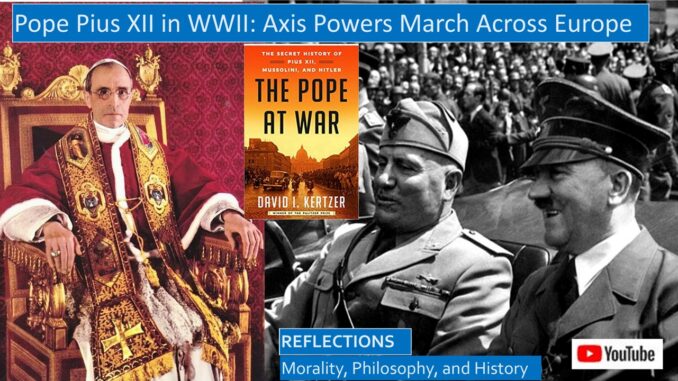
Pope Pius XII led the Catholic Church behind enemy lines in World War II, under the thumb of the fascist leader Mussolini, ally and admirer of Hitler. Mussolini was a friend and partner of the Catholic Church, though he was less of a friend after he went full Nazi in 1938 and started actively persecuting the Jews. Pope Pius XII was truly behind enemy lines after Italy was invaded, the Germans occupied Rome and Northern Italy for nine months in the closing years of the war when it was certain that the Axis would lose the war.
This YouTube video: https://youtu.be/L1bkOQNrlzg
Script with Amazon book links: https://www.slideshare.net/BruceStrom1/pope-pius-xii-wartime-pope-axis-powers-march-across-europe
Pope Pius XXII: Back Channel Between Hitler and the Pope
https://seekingvirtueandwisdom.com/world-war-ii-back-channel-between-hitler-and-pope-pius-xii/
YouTube video: https://youtu.be/6xdxvchkWyY
Pope Pius XII, Wartime Pope, Allied Powers Turn the Tide of War
https://seekingvirtueandwisdom.com/pope-pius-xii-wartime-pope-allied-powers-turn-the-tide-of-war/
YouTube video: https://youtu.be/pjMa3JdjW48
Pope Pius XII, Wartime Pope, Could the Pope Have Done More To Save the Jews?
https://seekingvirtueandwisdom.com/pope-pius-xii-wartime-pope-could-the-pope-have-done-more-to-save-the-jews/
YouTube video: https://youtu.be/ONnAcLLBNog
When David Kertzer wrote the Pulitzer Prize winning book, The Pope and Mussolini, the archives of Pope Pius XI had already been opened and available to scholars, and the Vatican had opened selected items from the archives of his successor, Pope Pius XII. We discussed the various concordats granted by hostile governments to the Catholic Church, the first by Napoleon who, in his coronation, seized the crown from the pope and crowned himself, an ominous omen.
800: In the coronation of Charlemagne, the pope crowned the emperor.
1801: Concordat between Napoleon and Pope Pius VII
French Revolutionaries had seized church property and martyred clergy,
this Concordat recognized the Catholic Church and agreed to pay clerical salaries.
This established the precedent that the Catholic Church would sign Concordats with hostile regimes.
1804: In the coronation of Napoleon, Napoleon seized the crown from the pope and crowned himself.
1870: Rome captured by revolutionaries in the Italian Reunification.
1922: Mussolini is appointed Prime Minister by King Victor Emmanuel III.
1929: Lateran Treaty, Concordat between Mussolini and Pope Pius XI.
1933: Reich Concordat with Nazi Germany signed,
this was negotiated by Papen and Cardinal Pacelli, future Pope Pius XII.
The Reich Concordat was part of the long history of the Catholic Church seeking reproachment with regimes potentially hostile to the Catholic Church, seeking the survival of the Church in an increasingly secular world.
We discussed the history of the Reich Concordat in our video reflecting on how Christians Survived Living in Nazi German Under Hitler. In addition, we discussed the sparks that led up to the start of World War II in Germany, we discussed these milestones:
1933: Reich Concordat with Nazi Germany signed.
March 1937: Palm Sunday Encyclical “With Burning Concern”
condemning Nazism read from German pulpits, increasing the persecution of the Catholic Church.
March 1938: Germany occupies Austria.
September 1938: Munich Agreement, Munich Agreement and appeasement, when PM Neville Chamberlain declared that there is “Peace in our time.”
German Sudetenland from Czechoslovakia is annexed.
February 10, 1939: Pope Pius XI died.
The complete archives of Pope Pius XII were opened in 2019, then were closed for Covid, and our favorite author David Kertzer was waiting on the steps for the archives to open so he could begin his next enthralling book, The Pope at War, filling in much detail on the years of the war. Maybe he should have titled the book, The Pope Behind Enemy Lines During WWII, but he did not ask me.
Cardinal Pacelli, former Nuncio, or ambassador to Nazi Germany, was crowned Pope Pius XII, taking the same name to signal that no major changes were planned in his papacy, mere months before World War II erupted in Poland.
February 10, 1939: Pope Pius XI died.
March 2, 1939: Cardinal Pacelli was crowned as Pope Pius XII.
March 1939: Remainder of Czechoslovakia is annexed
September 1939: Germany invades Poland.
May 1940: Germany invades France and the low countries.
We must remember one important fact: in 1939 and 1940, Hitler had triumphantly conquered continental Europe, and nobody could imagine how Churchill and England could once again challenge Hitler in Europe after the evacuation of English and French soldiers from the beaches of Dunkirk. The consensus was, whether they liked it or not, that the Catholic and Protestant Churches would have to learn how to live under the brutal regime of Nazi Germany, no reprieve was expected, many felt that the war would soon be over with the Nazis triumphant all across Europe. That probably would have been true had someone other than Winston Churchill had been appointed Prime Minister of Great Britain.
David Kertzer outlined in his Foreword and Prologue some of the challenges facing Pope Pius XII early in his pontificate:
- “How the pope balanced his public stance of neutrality while presiding over an Italian church hierarchy that enthusiastically supported the Axis war effort” and Mussolini.
- “How Italy’s Catholic clergy urged all good Catholics to fight on Hitler’s side, despite their uneasiness with the Nazi regime.”
- The Pope and the Curia had real-time reports of the atrocities committed against both the Jews and the Catholic clergy and intellectuals of Poland. How could the church both guarantee the future of the church while also denouncing the evildoers? After the war began, Pope Pius XII was wary, worrying that publicly criticizing the Nazis would have no other effect other than the increased persecution of the church.
- Pope Pius XII also had to be careful not to antagonize the Catholic faithful in other countries, in particular the United States, which helped fund the Vatican.
- How to respond to an evil Nazi regime that publicly sought to replace Christianity with a twisted pagan racial cult?
Which ideology was seen as the greatest danger to the Catholic Church at the time? Of course, the communists, who had martyred Christians by the millions in Soviet Russia, and who had murdered clergy by the tens of thousands in the Spanish Civil War? Or was the brutal Nazi regime worse? [1]
Complicating this question is the reality that the Spanish and Italian fascists, and later the regime of Vichy France, had been both the sworn enemies of communism and friends of the Catholic Church. Both sides in the Spanish Civil War were brutal, both sides committed numerous massacres. While the Communists on the Republican side massacred priests, monks, and nuns by the thousands, the Nationalists under the fascist leader Franco massacred public schoolteachers and other liberals, socialists, and communists. Mussolini had negotiated the Lateran Treaty, and he and Franco had encouraged the Catholic Church to become involved in the public education system in Italy and Spain. But while Franco never persecuted the Jews, in contrast Mussolini went full Nazi in 1938, adopting many of the Nazi race laws, persecuting the Italian Jews.
Why was Cardinal Pacelli selected to become Pope Pius XII? The cardinals selected the pope they thought would be most likely enable the papacy to survive while behind enemy lines, they selected a pope who was a careful, courteous, and caution diplomat. The French ambassador to the Vatican noted that, in Kertzer’s words, “Pacelli had spent his entire adult life as a Vatican diplomat and had never held a pastoral position. This had left him with habits of reserve, of prudence, of finding ‘balance’ that led him to avoid offering any harsh words of criticism,” which sometimes led to a lack of clarity, and perhaps a lack of moral purposefulness.[2]
Kertzer notes, “Having served as the Vatican secretary of state for the past nine years, Pacelli had indeed become closely identified with his papal predecessor. But the two men were very different in both background and personality. Pius XI came from a modest northern Italian family; his father was a textile factory manager. Pacelli came from the so-called black aristocracy, the Roman elites closely identified with the popes since the times they had ruled the Papal States as pope-kings.”
Kertzer has a Plutarchian observation reflecting on the moral character of the new pope. Kertzer notes that Pope Pius XII, unlike his successor the jovial Pope John XXIII, preferred to eat alone in his private dining room. “According to Sister Pascalina,” his housekeeper, “the little canaries he kept in a cage by his side when he ate sang a particularly beautiful song on that propitious day” when he was crowned as the new pope. “Ever attuned to the birds’ moods, the pope interrupted his meal to open the little door and let them out. They flew onto the table and the empty chairs, keeping him company until he finished his meal. Then, one by one, he induced them to perch on his finger as he returned them to their cage and closed the little door.”[3]
Pacelli was not an admirer of the Nazis. While in Munich, he witnessed the Nazi attempted 1923 coup, the Beer Hall Putsch, which tried to duplicate the success of Mussolini’s March on Rome. This fiasco led to Hitler gaining publicity and imprisonment, where he wrote his Mein Kampf manifesto, known as My Struggle. When he was papal nuncio to Berlin, Pacelli often hosted receptions attended by President Paul von Hindenburg and members of the German cabinet.[4]
GERMANS BLITZKRIEG THROUGH POLAND
What should be the response of the Vatican to the news that the German army invaded Poland? The Vatican is an independent state, with a press that is independent from the Italian government, although it is subject to control by the pope. The first response was that the Vatican newspaper reported that the German army was invading Poland. The Germans had gone through a lot of trouble to arrange a false-flag operation, so they could argue that the invasion was actually the fault of the Poles. Mussolini was not happy, and arrested Guido Gonella, the offending Vatican journalist. To get him released, the Vatican was compelled to promise that they would no longer criticize the German invasion of Poland.
Kertzer writes, “While the Italian dictator was pressuring the pope to remain silent, the Polish ambassador kept trying to convince him to speak out. Reports from his country were indeed alarming. As German forces moved through western Poland, destined to be absorbed into the Reich, hundreds of priests, thought to be inspiring Polish nationalism and Polish resistance, were being arrested. German priests were being brought in to replace them. In the end, more than half the priests in western Poland would end up in concentration camps, where many would die, while many seminaries, church schools, monasteries, and convents were shuttered. Church charitable institutions were closed, and outdoor shrines, crosses, and other church ritual sites dismantled.”
Confronted by these pressures, Pope Pius XII pondered. What to do? What to say? His little rowboat of a mini state was bobbing about in a vast, churning totalitarian sea. Maybe the pope could bless Poland, maybe the pope could say he loved all people, but especially the people of Poland. But this was a time of war, nothing he could say or do could help the people of Poland, Germany cranked up the martial music, much of Germany were cheering on their soldiers. Anything the pope would say would crank up the persecution of the church in Germany.
So, Pope Pius XII said nothing. The Vatican paper discontinued commenting on the war situation. Let the facts speak for themselves, the pope reasoned.[5] But some after Guido had been released, the Vatican paper, without editorial, reported how Jews in Poland were forced to sew yellow cloth triangles to their clothes, and how the Jews were being herded into a “reserve,” a euphemism for the Warsaw ghetto. But when Hitler survived an assassination attempt, the pope picked up some compassion points when he sent the dictator his congratulations.[6]
But Pope Pius XII did not want to be silenced indefinitely. Perhaps he did not want to seem weak, perhaps he knew he needed to communicate to the universal church how evil should be confronted. After his predecessor Pope Pius XI had passed away, an encyclical was found that he was planning to release that stridently criticized Nazism. Pope Pius XII thought this encyclical was unwise, thought that he was a bit too blunt in his admonitions against Nazism, so he suppressed it. But a month after the Germans invaded Poland, Pope Pius XII released the encyclical Summi Pontificatus, On the Unity of Human Society. Kertzer’s description is succinct, this encyclical “attributed the evils of the world to the spurning of Christ’s teachings. True, Scripture does exhort us to obey earthly authorities, but this is not an absolute command: the pontiff urged ‘the Soldiers of Christ’ to combat the ‘ever-increasing host of Christ’s enemies.’” “The pope condemned any attempt by the state ‘to attribute to itself that absolute autonomy which belongs exclusively to the Supreme Maker.” The state is not Almighty, the state can never define morality.[7]
NAZI BLITZKREIG OVERWHELMS FRANCE
The German generals had tried to convince Hitler that Germany was not ready for a continental war. Mussolini needed no convincing, neither he nor his generals, nor the Italian people, were itching for another war, and Mussolini had not sent in Italian troops to assist in the conquest of Poland, as Poland was on the other side of the Alps. During the Phony War in the months after the conquest of Poland everyone was asking the question: When would the invasion of France begin?
Mussolini was certain that invading France would be fatal to Germany, predicting that a million soldiers from the Third Reich would be killed in battle, with many more casualties.[8] Ten months after the invasion of Poland began, early in the morning Hitler’s ambassador to Rome informed Mussolini that the invasion of France had begun.[9]
To put this in perspective, after a month of invading France in World War I, the Germans get bogged down in trench warfare about forty miles from Paris. In World War II, the Nazis blitzkrieg to Paris in two weeks, and at six weeks they reached the Pyrenees mountains.
When reading history, we tend to view past events as inevitable. But future events are never inevitable, the future has many paths forking ahead, with decisions that could go either way. Future military events are even more uncertain, in 1940 the last major World War had ended decades prior, and the Polish invasion was a resounding success, but how would the Germans fare when battling the French army, by far the largest army with the largest number of tanks in Europe? Perhaps it would have been more of a slugfest had the Germans used the same invasion routes that geography had dictated in World War I.
What is often forgotten was that the winning flanking tank movements through the dense Ardennes Forest, thought by many to be impenetrable by tanks, was not favored by the majority of the German war staff. Hitler overruled them, the prospect of a decisive victory appealed to him, despite the obvious risks.[10]
The opening of World War II proved the effectiveness of the new technology and tactics of combining swift advance of the newly designed tanks and infantry aided by the new Stuka dive-bombers. In Kertzer’s words, “the Wehrmacht’s advance went more swiftly than anyone could have imagined. Within four days, the Dutch resistance was largely crushed, and the Belgians were in retreat. The massive German tank assault on France had begun.” We know how the British were barely able to rescue many of the outflanked British and French troops from the beaches of Dunkirk. “Worried the Italians would soon join the attack; the French saw the pope as their last hope.”
The French ambassador to the Vatican pleaded for the pope to condemn this Nazi aggression. Kertzer tells us, “It was clear to the pope that this was a war that Germany was likely to win.”[11] Furthermore, “It is impossible to understand the pope’s actions without recognizing he had good reason to think the church’s future would likely lie in a Europe under the thumb of Hitler and his Italian partner. Many were convinced the war would be over in a matter of months, with the continent in the hands of the Axis powers and Britain suing for peace.”[12]
Even after the successful invasion of France, the Polish ambassador to the Holy See continued to push for a condemnation of Nazi Germany’s brutalities that continued in Poland. Although he was hesitant to explicitly criticize the Nazis, Pope Pius XII realized something needed to be said, so he held a special mass honoring the victims of war in St Peter’s Basilica that would be broadcast on the Vatican radio, appealing to order and justice and equity, a consoling message that was not so specific that it could not be spun to the favor of both the Axis and the Allied powers. The pope was still convinced that the Axis powers would win the war.[13]
Fearing that the rapid German advance into France would conclude before Italy could share in the spoils of war, Mussolini hurriedly declared war on France, without consulting his cabinet, invading the mountainous passes on the French border. Here the French army offered stiff resistance, Mussolini’s troops managed only to win a sliver of territory. This did not help the reputation of the Italian army.
What was the pope’s response? Kertzer says that the pope refused to pander to Mussolini. “Mussolini had expected Rome’s church bells to ring” festively, “but they remained silent.” The pope said he would never ring “Rome’s bells to celebrate a declaration of war. If the Fascists wanted to have them ring, they would be able to do so only by force. In the end, no one made such an attempt. This was not a time to antagonize the pope.”[14]
Who would be the next to fall? Kertzer reports, “At the Vatican, virtually everyone expected Hitler to launch his invasion of Britain in July, and it seemed likely he would succeed in adding Britain to his conquests. Meanwhile, Italy’s Catholic clergy and church institutions continued to do what they could to encourage popular support for the war.” The pope would not temper this patriotic enthusiasm.[15]
THE POPE AND CATHOLIC CHURCH, UNDER THE NAZI THUMB
Now that the Axis powers of Germany, Italy and Spain had a firm grip on the European continent, what news should the Vatican newspaper print? Pope Pius XII asked Monsignor Montini, the future Vatican II Pope Paul VI, review their options:
- “The Vatican daily could publish official war communiques from both sides of the conflict, but this would mean having the paper banned in Italy, antagonizing Mussolini.”
- The paper could publish “only Axis war communiques, but that would damage the Vatican’s prestige abroad.”
- “Publication of the paper could be suspended,” which was not a good option.
- “This left only one realistic option, having the paper focus entirely on church business and religious life.”[16]
Today’s historical remembrances differ from the remembrances of those Europeans so soon after the Nazis seized control of the continent. Today we can never avert our gaze of the bulging eyes of the skeletal survivors of the Nazi concentration camps. Although Europeans in 1940 remember the Kristallnacht and the Night of the Long Knives, the death camps were still in the future. Instead, Catholics remembered how the French Revolutionaries martyred Christians and seized church property, and how these horrors were repeated by the Russian communist revolutionaries who martyred Christians by the millions, and by the communists who likewise martyred clergy by the thousands in the Spanish Civil War. Catholic clergy in 1940 distrusted both democracy and communism, supporting the fascists who were the enemies of communists and the friend of the church in Fascist Italy, Fascist Spain, and Vichy France.
When the Nazis overran France, the liberal socialist ministers fled to form a French government-in-exile, but the conservative ministers, led by the hero of World War I, General Petain, formed the pro-Catholic, anti-Semitic Vichy French regime that collaborated with the hated Nazis. The French Catholic Church interpretted this conquest as a punishment from God and sought to increase the role of the Catholic Church in French law and culture.
The pope approved. When Pope Pius XII met with the French ambassador, he “told him how impressed he was with Marshal Petain. Having been worried in the past that Communists might take over France, the pope welcomed the appearance of a strong leader who could expunge that danger for good. It had indeed been Communist subversion, thought the pope, that had led to France’s humiliating defeat. He told the ambassador of a report he had heard that, as the German army approached, a large number of French troops deserted while singing the Communist ‘Internationale’ anthem. Perhaps the pope even believed the implausible story. ‘What a difference from the war of 1914,’ remarked the pontiff.”[17]
Today we find it difficult to understand how the government officials in both Mussolini’s Italy and Vichy France would cooperate with the Nazis in their persecution of the Jews, sending many to the death camps.[18] Many Catholics in the interwar years were deeply anti-Semitic, we had reflected on how the pre-war Dreyfus Affair that split French politics for over a decade revealed how deeply anti-Semitic many devout Catholics were.[19] The Vichy French ambassador to the Holy See commented that “although the church condemned racism, it had long recognized that a ‘Jewish problem’ existed, and indeed from the time of the Middle Ages, the popes themselves had acted to keep Jews from a variety of occupations,”[20] and had established ghettoes to house the Jews.
To understand the pope’s ambivalence towards fascism, we must remember that many in the Curia distinguished between good Fascists, those “loyal, conservative Catholics who sought a close, mutually respectful collaboration between the church and the regime, and bad fascists,” including Hitler, “who were either actually left-wing anticlerics or “bellicose, anti-religious fanatics who were strong supporters of the Third Reich and adversaries of the Holy See.”[21] There were many who, even after the revelations about how Jews were gassed in the death camps, praised fascism and Nazism for opposing communism. An editor of a Catholic newspaper blessed the Italian soldiers departing to oppose Russia on the Eastern Front, these soldiers “were on their way to do battle against the murderers of Catholic Spain, the ‘Godless,’ the irreducible enemies of Christian civilization.”[22]
Mussolini was seen as a sometimes friend of the Catholic Church, but the Church had reason to fear the motives of Hitler and his Nazi officials. Kertzer reports, “Amid the growing certainty of German victory, the pope was unsettled by a troubling rumor. Ribbentrop was said to have told Ciano,” Mussolini’s son-in-law, “that once the war ended, the Axis powers should evict the pope from Rome. The new Europe, the German foreign minister was alleged to have said, would have no place for the papacy.” When asked about this, Ciano offered a heated denial of this conversation.[23]
THE TIDES OF WAR BEGIN TO TURN
The tides of war started turning slowly against the Axis powers. Hitler had hoped to invade the British Isles, but first the Nazi Luftwaffe would need to gain mastery of the air. The British had a secret weapon, they had developed an effective radar system, and the RAF fighters were able to counter the Nazi fighters and bombers, winning the Battle of Britain. Winston Churchill summed up this victory: “Never in the field of human conflict was so much owed by so many to so few.”[24] We compared Churchill’s remarkable speech praising the brave pilots of the Battle of Britain to Lincoln’s Gettysburg Address and Pericles’ Funeral Oration.
Mussolini had less success in establishing a new Roman Empire. The Italian armed forces were the laughingstock of Europe, both the Allies and the Axis began to view Italy as the soft underbelly of Europe. Mussolini fancied himself as a modern Roman conqueror, he had earlier defeated the mighty empire of Ethiopia in Africa, and early in 1939 he added the mighty country of Albania to the Italian conquests, which did not thrill the pope.[25] But Mussolini had less luck in North Africa, when the British beat the Italians, Anthony Eden, the British foreign secretary, quipped, “Never had so much been surrendered by so many to so few.” The Italians lost even though they greatly outnumbered the English.[26] The German army sent to save Mussolini had some successes in North Africa, led by the famed tank commander, General Rommel.[27]
With his plans to invade England thwarted, Hitler planned to invade the Soviet Union, so he visited each of his allies to shore up support. Hitler had no luck in drumming up meaningful support from either General Franco of Spain or General Petain of Vichy France.[28] Hitler knew Mussolini was itching to go into battle, he was hoping that he could persuade Mussolini from invading Greece from his foothold in Albania as his train pulled into the station in Florence, Italy. El Duce proudly announced to the Fuhrer that his “troops victoriously entered Greece at six this morning.” When Hitler fell silent, because he was too late, Mussolini reassured him, “Don’t worry, in two weeks, it will be all over.” But the Greeks defeated the Italian forces as soundly as had the French forces earlier in the war. Greece was too close to the Romanian oil fields so important to the Nazi war effort; Hitler was forced to come to the rescue of his hapless ally once again.[29] This delay may have kept Hitler’s panzers out of Moscow.
Once the mighty Nazi war machine had conquered first Greece, then Yugoslavia, securing the Balkan flank, Hitler pivoted to invade the Soviet Union in late June 1941, in Operation Barbarossa. Kertzer reports, “Before long, 3.5 million German soldiers, joined by 700,000 German-allied troops, including the Italians, would face a Red Army numbering 5.5 million men.” At first, the invasion of Russia was even more successful than the invasion of France had been. “Hitler thought the eastern campaign would take no more than a few months.”
Kertzer continues, “At the Vatican, news of the German attack on the Communist state was greeted with great relief, for the prelates had long worried about the prospect of a triumphant Russia sharing in an Axis victory.”[30]
We know the barbarity of the fighting on the Eastern Front, during the course of the war both sides together suffered tens of millions of military and civilian casualties. By early December, the Germans were within fifteen miles of Moscow when the bitter winter blizzards and arctic cold stopped the German army in its tracks, the Germans were utterly unprepared for this subzero winter war, many German soldiers froze to death.[31]
Pope Pius XII, as did the pope in the first world war, wanted to convene a peace conference. President Roosevelt demurred, he insisted on unconditional surrender to this evil dictator, he did not want the German conquests validated.[32]
WHEN IS IT BEST TO SAY NOTHING?
Kertzer’s book is divided into four sections, in the first two sections the Axis powers have conquered Europe and are marching on the Soviet Union, in the last two sections the Axis powers are in serious retreat. The last chapter of the second section is titled, “Best To Say Nothing,” which describes the dilemma the pope found himself in. Credible eyewitness reports were coming across his desk on how millions of Jews were exterminated in gas chambers in death camps like they were so much vermin.
At one point the British envoy urged the pope to speak out. Kertzer reports that Cardinal Maglione responded that “there was no point having the pope protest the atrocities, as the Germans would simply deny that the charges were true.” The British envoy notes, “Papal timidity becomes ever more blatantly despicable.”[33]
Kertzer told a revealing story of a conversation between a young German officer and a priest on how the brutalities of the war deadened people’s sense of morality. This officer “boasted of having learned how to kill both a mother and her child with a single shot.” He then showed the priest “a photo of his own wife and children. Tears clouded the soldier’s eyes as he spoke of his deep love for his family.” When the priest shared this conversation with Pope Pius XII, the pope “told the priest he occasionally thought of excommunicating those who would commit such atrocities, but had decided against it, believing it would not stop the slaughter and might even spur greater anger against the Jews.”[34]
[1] David Kertzer, The Pope at War (New York: Random House, 2022), pp. xxxi-xxxvi, and p. 34.
[2] David Kertzer, The Pope at War, p. 178.
[3] David Kertzer, The Pope at War, p. 30.
[4] David Kertzer, The Pope at War, pp. 22-25.
[5] David Kertzer, The Pope at War, pp. 80-85.
[6] David Kertzer, The Pope at War, p. 95.
[7] David Kertzer, The Pope at War, p. 89.
[8] David Kertzer, The Pope at War, p. 95.
[9] David Kertzer, The Pope at War, p. 129.
[10] https://en.wikipedia.org/wiki/Manstein_Plan
[11] David Kertzer, The Pope at War, pp. 132-133.
[12] David Kertzer, The Pope at War, p. 139.
[13] David Kertzer, The Pope at War, pp. 180-182.
[14] David Kertzer, The Pope at War, pp. 143-147, 154-155.
[15] David Kertzer, The Pope at War, p. 159.
[16] David Kertzer, The Pope at War, pp. 148-149.
[17] David Kertzer, The Pope at War, p. 162.
[18] David Kertzer, The Pope at War, pp. 184-187.
[19] https://youtu.be/yYpNrhpmsYw
[20] David Kertzer, The Pope at War, p. 214.
[21] David Kertzer, The Pope at War, p. 165.
[22] David Kertzer, The Pope at War, p. 206.
[23] David Kertzer, The Pope at War, p. 200.
[24] https://en.wikipedia.org/wiki/Battle_of_Britain
[25] David Kertzer, The Pope at War, pp. 41-43.
[26] David Kertzer, The Pope at War, p. 191.
[27] David Kertzer, The Pope at War, pp. 197-198.
[28] David Kertzer, The Pope at War, p. 179.
[29] David Kertzer, The Pope at War, pp. 174-177.
[30] David Kertzer, The Pope at War, p. 204.
[31] https://en.wikipedia.org/wiki/Operation_Barbarossa
[32] David Kertzer, The Pope at War, p. 239.
[33] David Kertzer, The Pope at War, p. 231.
[34] David Kertzer, The Pope at War, p. 225.

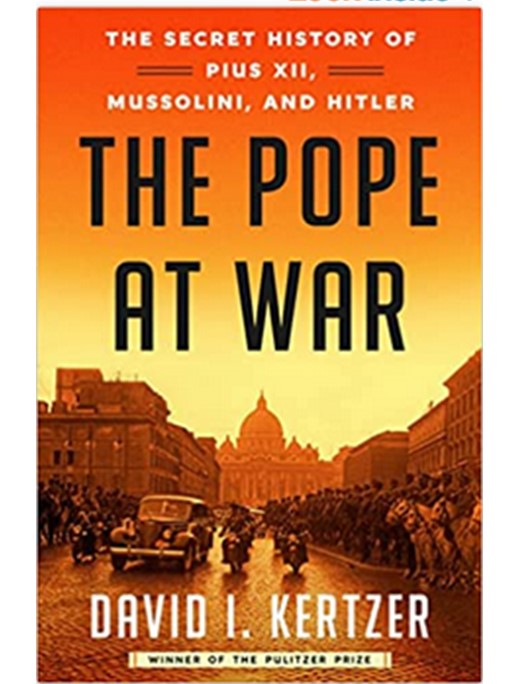
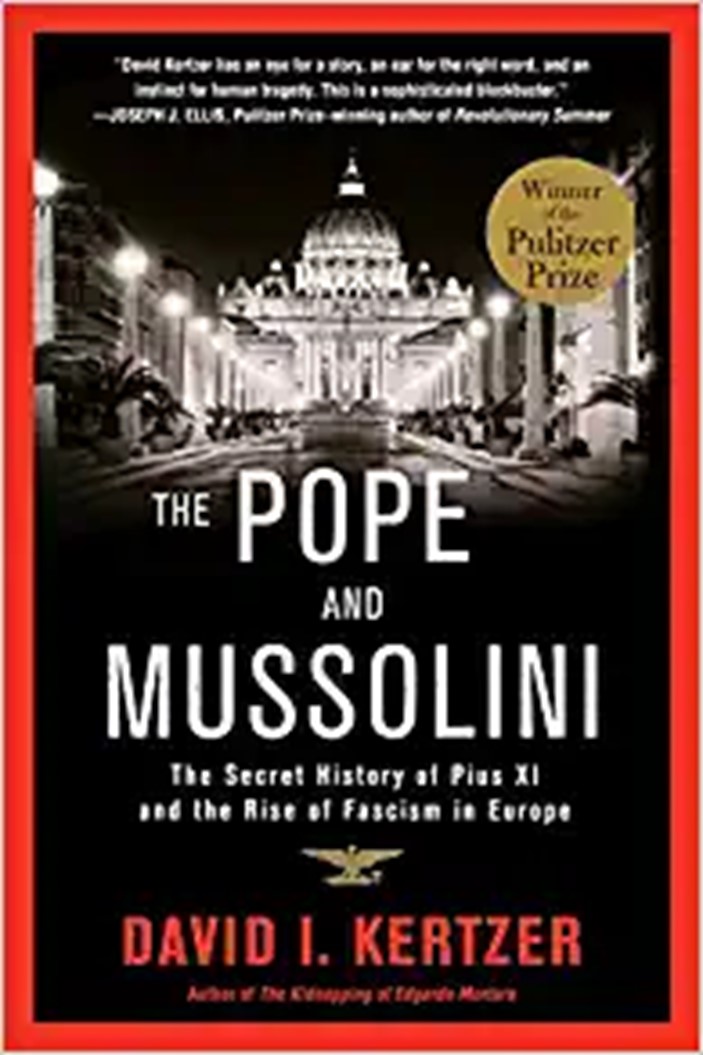

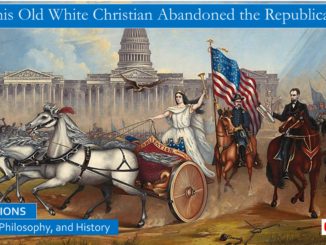
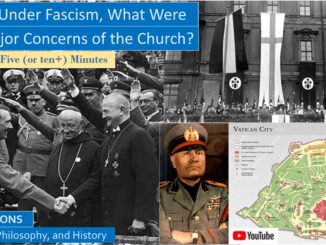
3 Trackbacks / Pingbacks